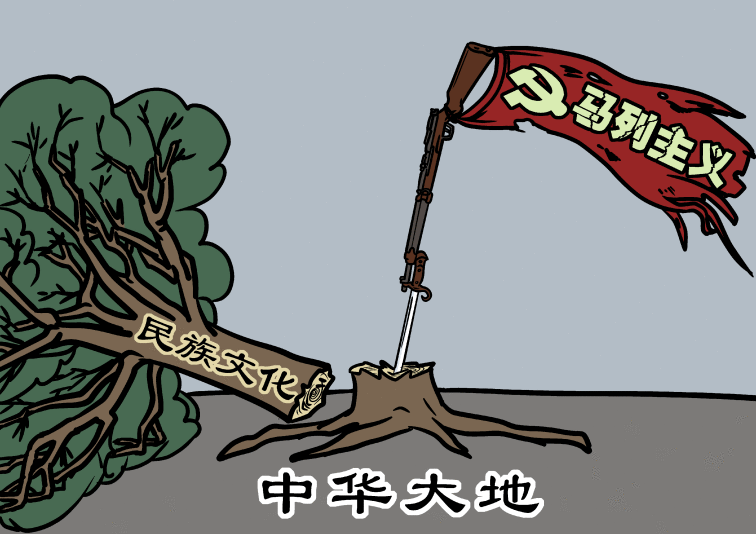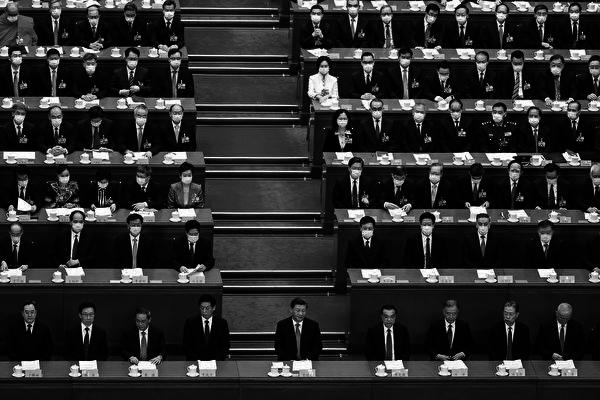Heavenly signs and phenomena often correspond to the rise and fall of dynasties, the fortunes and misfortunes of the world, and the blessings and disasters of mankind. (pixabay)
[People News] 5. The Mysterious Little Cloth Bundle
When I was in third or fourth grade, I began using my eyes to observe society and compare what I saw with the thoughts forming in my mind. I constantly questioned everything around me. As I began to form my own little circle of friends—classmates and neighbourhood kids—I gradually discovered the economic disparities between our families. In my eyes, a miniature society began to take shape.
One day, while crawling around in a friend’s kang cabinet (a heated platform bed with storage underneath), I suddenly wondered why we didn’t have such a fun piece of furniture at home. After this realisation, I started to notice more and more differences—nearly all of my friends had kang cabinets, wardrobes, or desks. Some cabinets were decorated with porcelain tiles or carved wood, exuding an elegant, antique charm.
One of my friends innocently pointed out, “Huangmao, why does your house have nothing? Why is your family so poor? Look at our cabinet—it’s so fun. Tell your aunt to buy one too.”
From then on, I began observing and comparing these differences. My family truly didn’t have any furniture of value—nothing worth a dime. In our large room, the south side was lined with two large wooden crates used for shipping goods, filled to the brim with books. Next to them were two so-called cabinets—paint peeling, wood rotting, corners and edges worn down, crumbling to the touch. Then there was a very simple writing desk that my mother had borrowed from her workplace for us kids to take turns doing homework. That was the entirety of our household belongings.
When I asked my grandmother and mother why we didn’t have those cabinets or wardrobes, my mother said, “Those were passed down from ancestors. They don’t sell that kind of furniture anymore.”
“Then why didn’t we inherit anything? Why does our family have nothing...?” I fired off a string of questions.
Grandma replied, “Supporting six children with food, clothing, and education costs a lot. That’s why we can’t afford anything. You six siblings are the greatest treasure we have. What matters most is that you study hard and grow up to be successful. We don’t need those cabinets!”
Mother added, “If you study well and become someone useful to the country, everything will change!” Every time, the topic was swept aside like this.
Once, I discovered that the cabinet that was always locked wasn’t locked that day. Boldly, I took off the lock and opened it. Carefully searching through each shelf, I found only two things that piqued my curiosity: a thick stack of ration coupons I couldn’t understand, and a tightly wrapped cloth bundle. I carefully opened the bundle and was stunned to find an exquisite piece of soft satin in lake-blue with red floral patterns. I had never seen anything so beautiful. I held it up in awe and unfolded it—it was a finely tailored qipao dress.
My classmates exclaimed in amazement, “Wow! So beautiful!”
We all held it up to ourselves and admired it for a while. There were also two white cloth door hangings—one embroidered with the words “A Spring of Countless Blossoms” and clusters of flowers; the other read “Blissful Union Under a Full Moon,” both vibrant and colourful. Clearly, they belonged to my mother. But where did she get such beautiful clothes? Why had I never seen her wear them?
Afraid of getting scolded for snooping, I never asked. But that beautiful qipao and the embroidered door hangings—“A Spring of Countless Blossoms” and “Blissful Union Under a Full Moon”—remained etched in my memory.
In the years that followed, I gradually came to understand: those items symbolised an era, bore the stigma of an imposed class identity, carried the weight of a family’s suffering, and chronicled a history of hardship.
6. Picture Storybooks of Childhood
Though we had nothing materially, I never lacked love: the love among siblings, the love of my parents, and the vast, kind, and nurturing love of my grandmother. These made my childhood warm and happy. My young heart, filled with love, didn’t care about other things.
Once I could hold a book in my hands, I began another kind of learning—through picture storybooks. My third-oldest brother had an endless collection. Reading these books brought me joy throughout my childhood and teenage years, and even as an adult, I still enjoy them, savouring the happiness they once gave me. The vivid illustrations captivated me. With my young heart, I tried to grasp the meaning behind each picture, one book after another, one hour after another. Often, my curiosity and focus would move the adults and my siblings to tell me the stories aloud. That made me even happier.
Just like Chaplin breaking through the silent film world into sound and motion, I eagerly awaited the day I could go to school and read on my own. Clutching my picture books, I began first grade and no longer needed to beg others to read to me. Like a thirsty traveler finding sweet spring water, I soaked up knowledge eagerly, eyes wide open to the world.
Once I could read on my own, I dove headfirst into those picture books. I loved listening to my brothers discuss the 108 outlaws of Water Margin, the battles of the Three Kingdoms, the adventures of Journey to the West, the legends of Yue Fei, the Yang family generals, Hua Mulan, and many other timeless heroes. When they argued or couldn’t agree, our father, well-versed in history, would explain things. Sometimes, even my mother joined in. Mother and grandmother mostly interpreted Dream of the Red Chamber for us. I read the entire novel in fourth grade, earlier than my siblings. Our parents feared we would misinterpret characters and events too simplistically, so they guided us carefully. Those were joyful times! Through their commentary, our parents infused the stories with Confucian values—benevolence, righteousness, propriety, wisdom, faith, and chivalrous ideals. They hoped to nurture our kindness and character. I loved the loyal heroes admired by my brothers and despised the traitors they hated. After hearing their discussions, I would rush to read the corresponding picture book, totally engrossed.
I often trailed behind my third brother like a little mouse pulling a wooden cart, helping him carry his large bag of storybooks. He and his friends often set up a bookstall on the steps outside the department store. I read through all of his and his friends’ collections. The illustrations were vivid, the language simple and direct, easier to understand than the originals, which made them unforgettable.
By fourth grade, I transitioned from picture books to reading full-length novels. I started devouring classics from both China and abroad. My parents’ two big crates of books became my treasure trove—part research, but mostly literature. By fourth grade, I had read The Generals of the Yang Family, The Story of Yue Fei, Romance of the Three Kingdoms, Water Margin, Journey to the West, and even Dream of the Red Chamber, albeit hastily. That opened a floodgate of reading.
Under my parents’ guidance and in our literary home, I began exploring the world through books. From ancient cultural history and Confucian morality to natural beauty—blue skies, forests, rivers—I internalised values of goodness and purity. Books taught me to feel joy and anger over right and wrong, to weep for loyal heroes, and to admire virtue. I learned to see the world with my own eyes and appreciate beauty with my own heart. These experiences quietly shaped my personality.
I remember in fourth grade, I borrowed the novel The Three-Family Lane from a classmate. I found its depiction of vile characters so repulsive that I tore the book in two and threw it on the ground in anger, then panicked and had to replace it.
But eventually, the struggle between good and evil leapt off the page and into the real world. The Cultural Revolution arrived! We were forced out of classrooms and into society. The rhythm of our innocent hearts was soon replaced by imposed will, thought, and obedience.
The Cultural Revolution Arrives
One day after school, I walked home silently, no friends behind me. Grandma asked, “Where are your classmates?”
“I didn’t invite them,” I replied.
“Why not?” she asked. I stayed silent.
Grandma was used to seeing me bring friends home to do homework and then run around the courtyard laughing like a bunch of chirping birds. But that day, I quietly did my homework alone and sat silently in the courtyard, resting my chin on my hand, lost in thought.
When my mother got home from work, Grandma pointed to me, signalling that something was wrong. Mother came into the courtyard and asked gently, “What’s wrong? You didn’t even greet me?”
Still, I said nothing. I looked at her as if I didn’t recognise her. Something heavy and unpleasant weighed on my heart. Finally, I couldn’t hold it in any longer and blurted out: “Mom, what does ‘class background’ mean? What does it tell people?”
Immediately, she looked tense but kept a light tone: “Why are you asking this? Did someone say something to you?”
I didn’t answer. Mother gently said, “Didn’t I tell you to write ‘revolutionary cadre’ when you fill out that section on the form?”
But that very answer hit a sore spot. I couldn’t help but angrily repeat what my classmates had said, word for word: “A landlord is a landlord, a capitalist is a capitalist—what’s a ‘revolutionary cadre’ supposed to be?” My eyes turned red, and I lowered my head, refusing to look at her.
My mother quietly lifted my chin and saw I’d already cried. Our eyes met, and her warmth made my tears fall in torrents. I sobbed and said, “Mom, what’s our family’s class background, really? The teacher won’t let me join the Red Little Soldiers. The classmates say it’s because our class background is bad.”
Her heart was pierced. What she had feared was now happening—one after another, we siblings were suffering this fate. It was an inescapable tragedy of that era. She, my father, and my grandmother carried even deeper scars. Watching us get hurt one by one was a pain they would have rather shouldered themselves, but they couldn’t take our place.
Holding my hand, my mother wiped away my tears and promised, “You’ll join the Red Little Soldiers in the next round.”
(To be continued)











News magazine bootstrap themes!
I like this themes, fast loading and look profesional
Thank you Carlos!
You're welcome!
Please support me with give positive rating!
Yes Sure!